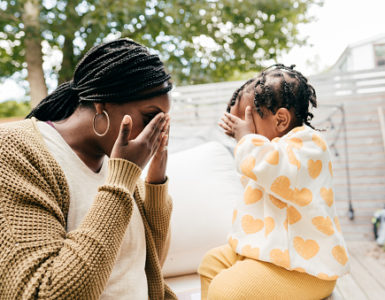If you are interested in adopting a child in Arizona or are considering placing your child for adoption or adopting a child in Arizona, I am going to walk you through the process from both perspectives.
For the Expecting Parent
Considering placing your child for adoption can be a big decision and one that you shouldn’t have to make on your own. It’s important for you to know what resources are available to you as you make this decision. If you find yourself in an unplanned pregnancy, there are ultimately three options to choose from. You can choose to parent your child, terminate the pregnancy, or place the child for adoption.
If you plan to parent your child, research the resources that are available in your area. If you are low income, you may qualify for Medicaid, WIC, and/or other government assistance. Think carefully about your support system, your ability to care for an infant, your finances, and your future. If you feel that you have a strong support system and resources to care for your child, parenting might be the best option for you. Here are some questions to ask yourself as you work towards your decision:
- How do you feel about parenting and taking care of another person?
- Is this time in my life suitable for being a parent?
- Am I able to take care of my child’s needs?
- Am I ready to deal with the stress that accompanies a child – money, sleep deprivation, and limited time?
- How will this affect my future?
- Do I have support from the people in my social circle?
Placing your child for adoption can be scary and very unknown territory. If this is something that you are considering, look for an agency in your area that has a good reputation. Ask around to friends, read reviews, and ask for references from the agency. You may want to ensure that you are working with an ethical agency that has the best interest of you and your child in mind. A good agency can offer counseling services, resources for living support and financial aid, and supportive communication throughout the process. If you are considering placing your child for adoption, here are a few questions you should think about:
- How do I feel about someone else raising my child?
- Is this a good time in my life to consider adoption?
- Will it be too hard for me to deliver a baby and give him/her to someone else?
- How will I handle the feelings of loss after the adoption is finalized?
- Do I feel any pressure to choose adoption?
- Do I have support from those in my social circle?
You are your child’s mother and one the most important person in your child’s life. You know what is best for him/her and what is best for your situation. If you choose to place your child for adoption, remember that you are able to make major decisions throughout the process.
You can decide what type of family that your child is placed with. You can make the decision of whether or not the family is a two-parent home, single parent home, a heterosexual couple or not. You can make the decision if the family your child is placed with already has children in the home or not. Do you want your child to go to a home where one parent stays home with the kids? Do they enjoy outdoor activities? Travel? Have a large extended family? Attend church? Are they religious at all? These are all decisions that you can make. When working with an agency, they should sit down with you to help you find your priorities and they will keep those in mind when they present you with different families. You will get to review multiple family profile books to see if there is a family that is a good fit for you.
You get to decide the level of openness of your adoption. Some parents want to have a closed adoption, where they don’t have any contact with their child after they are placed with the adoptive family. This can be a good fit for some cases where the child might be in danger or the birth family wants a fresh start. You can also have a semi-open or open adoption. The openness can range from limited contact throughout the child’s life to regular visits, shared pictures, updates, and emails. This is something that you can talk about with hopeful adoptive families before you decide you want to place your child with them.
You also will make the decisions about your pregnancy and birth plan. You can choose to have an unmedicated birth, the adoptive parents in the delivery room, or how soon you sign your parental rights. Your agency should work with you to create a hospital and adoption plan to make sure that everything goes smoothly. Ultimately, you are your child’s first mother. You get to make the decisions throughout the adoption process.
For Hopeful Adoptive Families
You are looking at adopting a child in Arizona. Now what? There are a few things that you will need to think about before you move forward in the adoption process:
- Why do you want to adopt?
- Do you want to pursue a domestic adoption, adoption through foster care, or an international adoption?
- What is your adoption budget?
- Do you feel support from those around you?
- How open do you want your adoption (closed, semi-open, or open adoption)?
- What age, gender, race, or level of disability are you comfortable with?
- Are you emotionally stable and capable of handling the ups and downs of the adoption process?
To adopt a child, you can either adopt through domestic infant adoption, foster care, or international adoption. Each process requires a home study.
Home Study
A home study is a written report that summarizes everything about your family and the people in your home. Some people find the process intimidating, but when you take it step by step, it can be very manageable. You will work with a licensed caseworker to complete your home study. Each form of adoption requires different things in the home study, so make sure that you find a case worker that can create the appropriate home study for you.
Your case worker should send you a list of documents and information that you’ll need before your home visit. These items generally include:
- Social security card and another form of ID (for example a driver’s license)
- Birth certificates
- Marriage license and/or divorce documentation if applicable
- Background check
- Medical insurance documentation
- Pet vaccinations if applicable
- Proof of pay (pay stubs, tax forms, letters from employers)
- References from family, friends, and professionals
Your case worker will schedule a time to visit your home. During your home visit, your case worker will look around your house to make sure that it is clean, has enough room for a child, and is safe. They will then sit down with your family and ask you questions and get to know you better. They may want to talk about your childhood, your extended family, your motivation to adopt, your career, your parenting philosophy, and just about anything else you can think of. They want to get a full and complete idea of your family so that they can complete an all-inclusive write-up. They will also want you to discuss the type of child that you are hoping to adopt (gender, race, age, disabilities). The case worker will then meet with each member of the family individually and interview them.
A hopeful adoptive mom spoke of her home study experience saying,
“We were really nervous before the home study, because we had heard that the case worker would ask us a ton of questions. I put cookies in the oven before the appointment so that our house would smell like fresh cookies when she arrived. Somehow, I forgot to put the timer on and the cookies ended up burning. It was an absolute disaster, but the case worker just laughed and was very understanding. She wasn’t there to find something wrong with us. She was there to learn more about us and help us get one step closer to adoption!”
Domestic Adoption
If you are adopting a child in Arizona and are hoping to adopt an infant, domestic adoption may be the best fit for you. You can choose to adopt independently or through an agency. An independent adoption is an adoption where you make a connection with the expectant family on your own, through a mutual friend, or through an online profile. Some families choose this option because the overall costs may be lower. You likely pay for travel, attorney fees, and possible birth mother expenses. A possible downside to this is the unknown length of time for a match and the little support provided for the birth family. If you work through an adoption agency, you should receive support throughout your adoption process and the birth family should also receive support before and after the adoption.
Adoption Through Foster Care
Foster care is a system put into place to provide safe homes for children. Children are placed into foster care because of neglect, physical abuse, and sexual abuse. Parents are given the opportunity to complete services in order to be reunited with their children. Required services are generally parenting classes, rehab, employment, proof of safe and consistent housing, or other programs that can support parents as they try to improve the quality of life for their children. While the parent is working services, their child or children are placed into temporary care. Depending on whether or not the parent completes the required services, parental rights can be terminated, and the child will be available for adoption. However the purpose of foster care is to reunify families. Unfortunately, there are some cases where the reunion is denied and the children then become available for adoption from foster care.
To become a foster parent in Arizona doesn’t cost anything. To be certified to adopt from foster care, you must complete a few tasks and show that you are a fit parent by sharing the following information:
- Be 18 or older
- Be a citizen of Arizona
- Complete a written application
- Attend adoption/foster care orientation and training
- Social history references
- Finances
- Moral fitness
- Physical and mental health
- Any court action regarding child abuse
- The ability of you and every adult member of your household to successfully pass a fingerprint-based criminal history records check
- Any other relevant information
In Arizona, you will work with a licensing agency to become a licensed foster parent. The licensing agency should complete your trainings, collect your documents, complete your home study, and work with you to ensure you are prepared and qualified to become a foster parent. For a list of the licensing agencies, you can visit the Arizona Department of Child Safety website.
If you are interested in directly adopting from foster care, you will need to become a licensed foster parent. Arizona has several reputable adoption agencies, but I would recommend The Gladney Center for Adoption. Although they are based in Texas, they help people around the country and the world. Many foster children are older, a part of a sibling group, and/or have a disability.
International Adoption
International adoption is when you adopt a child from another country. It is a unique process. You will need a home study completed specific to international adoption. Your home study can be done to align with Hague requirements, allowing you to adopt from a Hague accredited country. To help understand a little more about the Hague Convention, the Gladney website shares:
“The Hague Convention protects children and their families against the risk of unregulated adoptions abroad and ensures that intercountry (district) adoptions are made in the best interests of the children. The Convention also protects against unethical, unlawful, and inhumane adoption practices.”.
It can be incredibly important to find an agency that is Hague accredited to support you through your international adoption process.
Adopting a Child in Arizona
I hope that this article was able to help you, whether as an expectant parent or a hopeful adoptive parent. There can be a lot of information to learn, but with the right resources, you can have a better chance of succeeding in your journey.
Michelle Donner is the mother to two beautiful children and a hopeful adoptive mama of one more! When she isn’t chasing her kids around, she is working as an adjunct professor teaching college writing and working as a freelance writer. She loves to be creative and runs her own floral design business for weddings and events. Her titles of wife and mother bring her the most joy, fulfillment, and challenge in her life.




